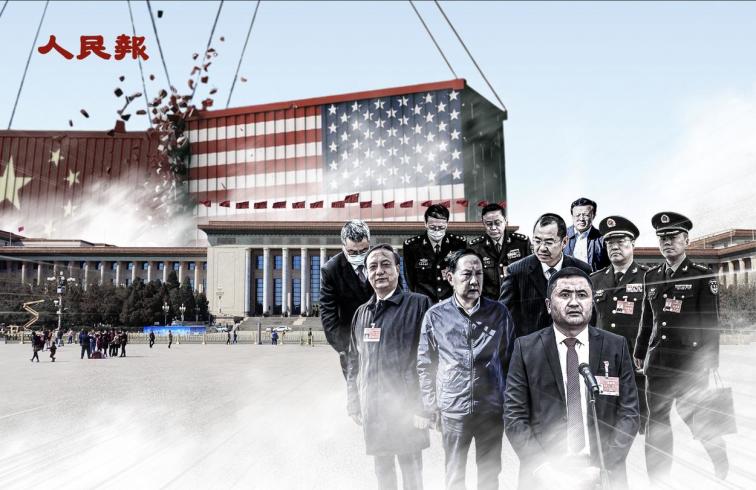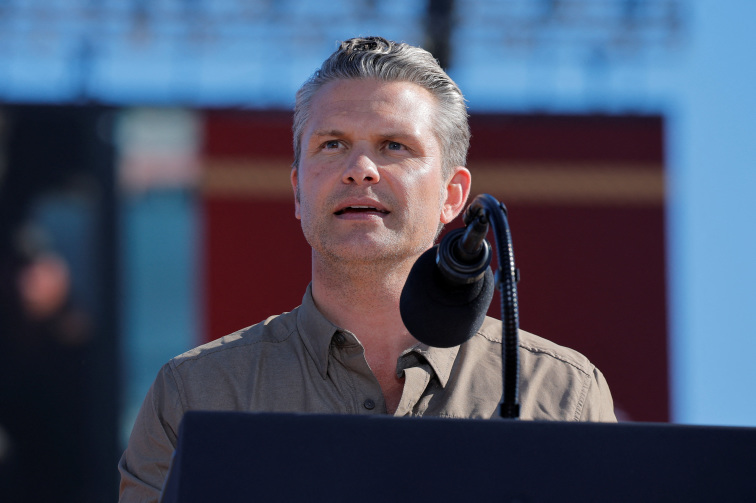Dark clouds loom over Beijing’s Tiananmen Square. (Feng Li/Getty Images)
[People News] The Fourth Plenary Session of the Communist Party of China has concluded. While the Communist Party's regime may seem stable on the surface, the messages that have emerged are astonishing to the international community. An article on the BBC Chinese website highlights three major messages derived from the meeting and the subsequent communiqué.
The Fourth Plenary Session of the 20th Central Committee of the Communist Party of China took place from October 20 to 23 and has now wrapped up. In an article published on October 26, the BBC Chinese website pointed out three key messages that emerged from the meeting and the communiqué.
The first key point is that the anti-corruption campaign may be more extensive than we think.
The 20th Central Committee of the Communist Party of China was established in 2022, comprising 205 central committee members and 171 alternate members. The attendees of the Fourth Plenary Session represented 84% of the total 376 current central committee and alternate members. Neil Thomas, a researcher at the China Analysis Centre of the Asia Society Policy Institute, noted on the X platform that this could be the lowest attendance rate since the post-Mao era.
Statistics indicate that approximately 18% of central committee members and 14% of alternate members were absent. Consequently, at the 2025 Fourth Plenary Session of the Communist Party of China, only 168 central committee members and 165 alternate members are expected to attend, marking the lowest attendance rate in the history of CPC plenary sessions since the 20th National Congress. Among those absent, one central committee member has passed away, and ten have been removed, leaving 26 still unaccounted for.
The BBC has raised the question of whether the absence of certain members suggests that more senior officials have been implicated in the latest round of "anti-corruption" efforts than has been reported.
Out of the 33 generals in the Central Committee, it appears that 22 were absent from the plenary session, including 8 who have officially been dismissed. However, the whereabouts of the other 14 remain unclear. Who are they, and what has transpired?
Among the absent Central Committee members and alternate members, 10 are civilians, while the remaining 27 are from the military. The military system has a total of 42 Central Committee members, with 27 absent, resulting in a high absence rate of 63%.
The Fourth Plenary Session confirmed the expulsion of 14 Central Committee members and alternate members from the Party, 9 of whom are affiliated with the military.
According to BBC analysis, these fallen generals show a strong geographical connection. He Weidong, Miao Hua, Lin Xiangyang, Qin Shutong, and Wang Xiubin all come from the 31st Group Army, which is based in Tong'an, Xiamen, Fujian. Xi Jinping worked in Fujian for 17 years from 1985 to 2002 and inspected this unit 14 times during that period. On August 1, 2014, Army Day, Xi Jinping also made a special visit to the 31st Group Army, marking his 14th inspection of this unit. Although Wang Chunning is not part of the 31st Army, he is also from the former Nanjing Military Region, which became the Eastern Theatre Command after military reforms. The other three generals have strong connections with Miao Hua, who wields significant personnel authority.
Among the generals mentioned, the only one whose case was not disclosed in advance is alternate member Zhang Fengzhong, who previously served as the director of the Political Work Department of the Rocket Force. This could indicate that the scale of corruption within the military is vast, and the scope of the purge continues to expand.
The most astonishing aspect to observers is that these generals, who have collectively fallen from grace, were all personally promoted and trusted by Xi Jinping.
This situation has ignited discussions among political analysts: Does it signify a weakening of Xi Jinping's authority? Or does it reveal that Xi Jinping is a paranoid leader, concerned that power factions may emerge beyond his control, prompting him to take a hardline approach against anyone, regardless of their rank or whether they are his close allies?
Nonetheless, there is a consensus among external observers that this phenomenon not only highlights Xi Jinping's shortcomings in personnel management but also indicates that he is in a precarious position with no capable individuals to rely on.
The second key point is the emphasis on technological "self-reliance and self-improvement."
The conference transcript from the party media Xinhua News Agency once again highlighted "self-reliance and self-improvement," while Xi Jinping's slogan "new quality productivity" frequently appears in government documents. This encompasses the promotion of independent research and development of high-end technologies—often with military applications—and aims to accelerate implementation through collaboration between private enterprises, state-owned enterprises, and the People's Liberation Army.
Li Chengpeng, a commentator from mainland media, interprets this as follows: "The previous model of extensive productivity is no longer viable or profitable; it needs to be upgraded. For instance, local governments that once relied on selling land and building factories must now pivot to AI, quantum communication, and new energy. However, due to international sanctions and trade wars, the number of external allies willing to assist is dwindling, compounded by internal systemic issues and corruption, making this transition very challenging in the short term. In other words, a village that used to process leather shoes now needs to transform into new energy; this is not something that can be achieved merely through a five-year plan from the Party Central or by stealing technology.
The third key point is the encouragement of domestic consumption.
Li Chengpeng stated, "It's not that people don't want to spend; rather, most truly have no money left, feeling exhausted and lifeless. Those with some money are also hesitant to consume or invest, fearing that policies may change again, akin to distant ocean fishing, where the door is closed and the dog is beaten."
According to a report by the BBC, scholars have warned that Beijing needs to rebalance its economy, focusing more on domestic consumption instead of exports. This is crucial because, in the long run, the share of Chinese residents' consumption in GDP is too low to be sustainable.
An article from Radio France Internationale noted that the real estate crisis, a weak social security system, and persistently high youth unemployment rates have all contributed to a decline in public consumption.
△










News magazine bootstrap themes!
I like this themes, fast loading and look profesional
Thank you Carlos!
You're welcome!
Please support me with give positive rating!
Yes Sure!